Dulwich College
Junior School
Junior Prospectus
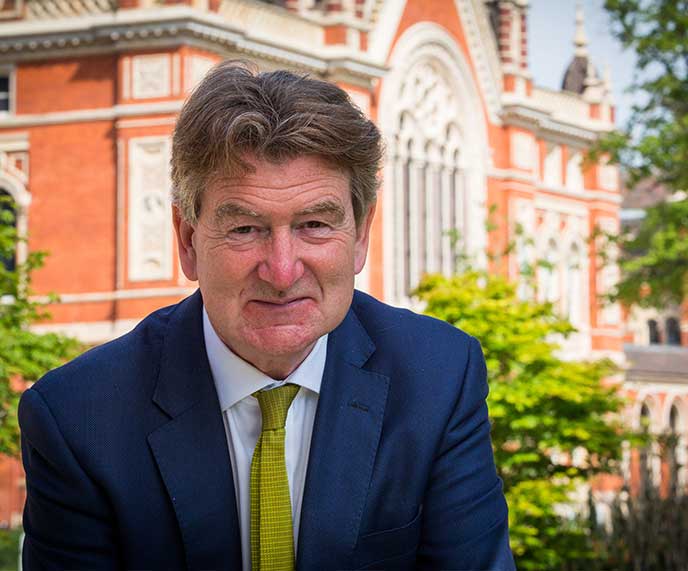
From the Master
When I’m asked to define the College in one sentence, I often say that it is a ‘doing’ school, which suits pupils who want to be involved with everything – whether they have a natural aptitude for a given activity or are simply enthusiasts. We learn through confident and selfless engagement. We learn most from service engagement, and that is a keynote of Dulwich 2023.
The provision of excellent teaching and learning is our priority and to this we add an exciting array of co-curricular activities which we believe results in a first-class holistic education. We talk to each other about the ‘primacy of the classroom’ (ensuring the examined syllabus is appropriate and covered by all teachers and pupils) and ‘free learning’ (the fact that so much that is important here goes on beyond the set curriculum and the formal classroom). I hope you pick up a sense of that on your visits to see us.
Our aim is to:
- offer academic challenges, which enable each pupil to realise his potential;
- create an environment that promotes an independent work ethic and encourages all pupils to acquire a love of learning; provide sporting, cultural and adventurous engagement for all our pupils to enjoy and through which they can learn to work co-operatively and to lead;
- nurture a supportive community that encourages a sense of social responsibility and spiritual and personal development;
- ensure that all our pupils feel equally secure and valued.
Our responsibility is to ensure that we fulfil these aims and build on our achievements to enable current and future Alleynians to be well prepared for the exciting challenges of life in the 21st century.
Dr Joe Spence
Master, Dulwich College
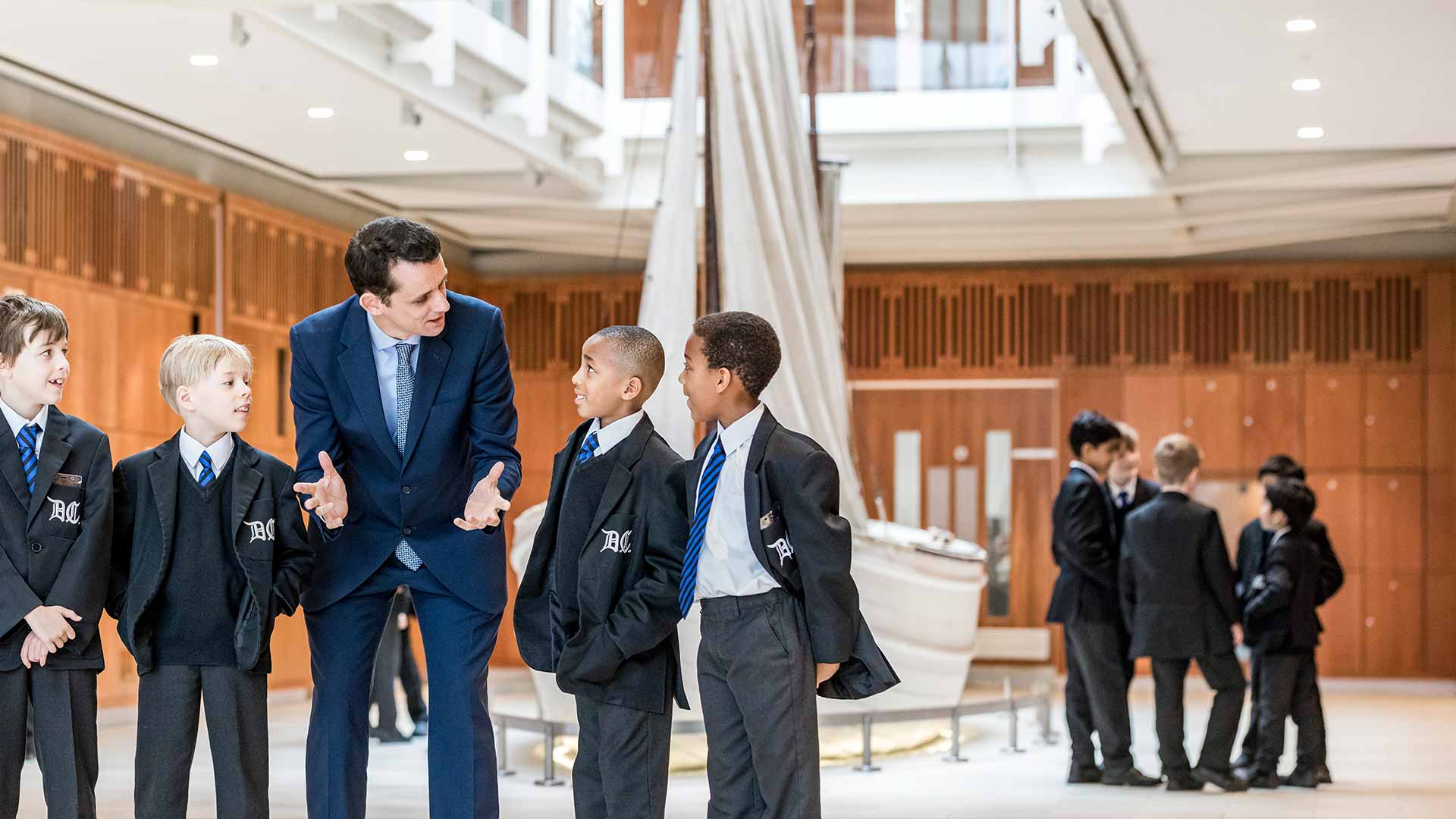
Welcome
At Dulwich College Junior School, we seek to create a stimulating environment in which boys can enjoy learning. Every boy is treated as an individual and encouraged to develop his own talents and abilities to the full. It is vital that our boys feel good about themselves as learners, as people and as part of a community, and we work hard to nurture a positive, challenging and happy atmosphere.
The Junior School is an integral part of Dulwich College, sharing the same aims and values but having the distinctive and special qualities of a Junior School. Our boys are bright, interesting and full of boundless enthusiasm for the opportunities around them. We provide pupils with an academically challenging curriculum while also encouraging them to explore their creative potential through Music, Drama and Art. As well as the many sporting opportunities the College provides, we have an extensive co-curricular programme to help boys develop and pursue their own interests and talents.
As teachers, our work begins by nurturing the boys’ qualities and skills which have been fostered at home. We believe in working with you to encourage your child to achieve high academic standards, to be confident, courteous, responsible and independent. We will help to instil a sense of right and wrong, respect for others and self-discipline.
Please explore our website to discover more about life in the Junior School and where you will find our page Equality and Respect with details of our plans for the future. If you think this might be the right school for your son, we warmly invite you to visit us and look forward to meeting you.
Dr Toby Griffiths
Head of Junior School, Dulwich College
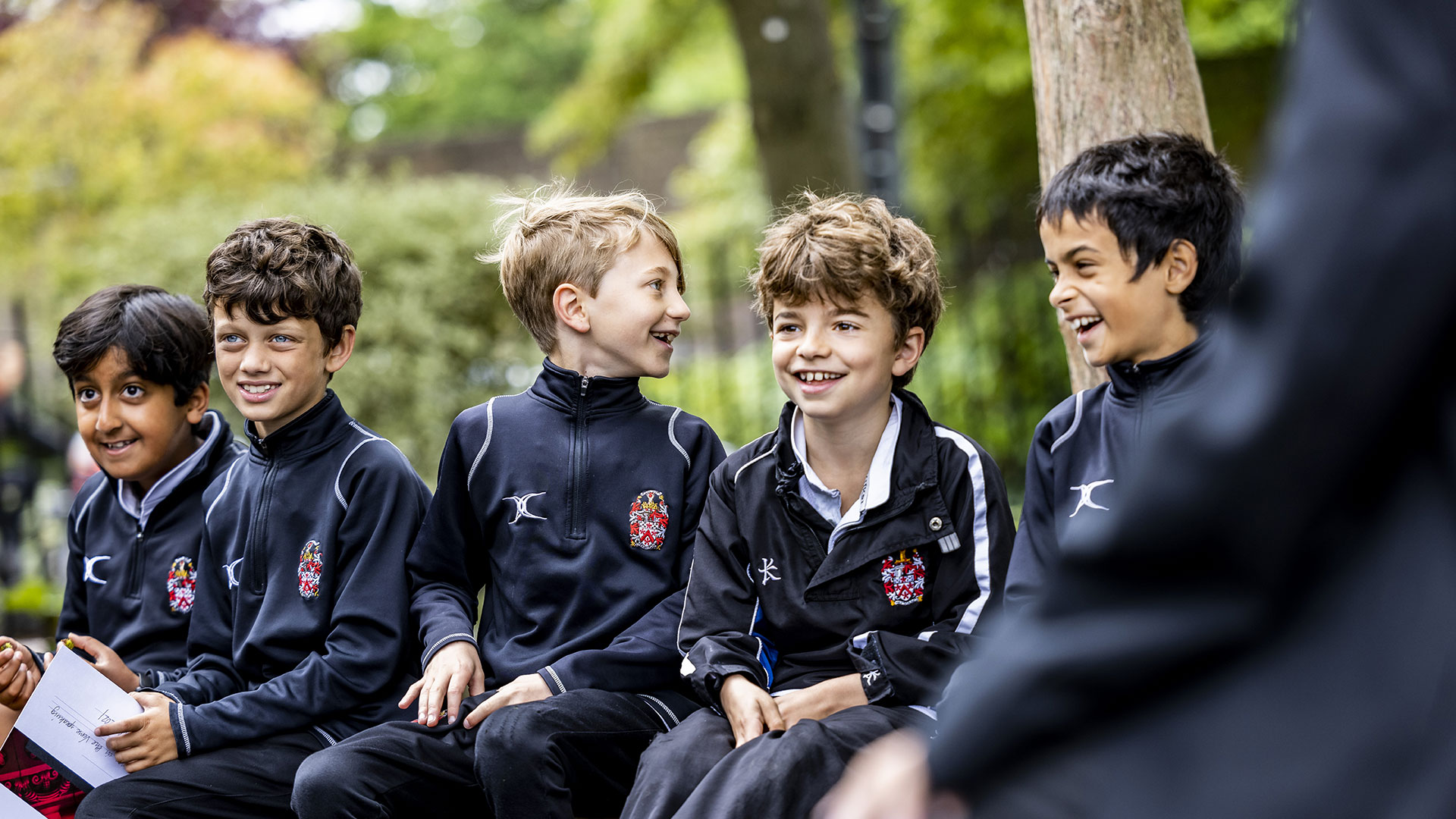
The Dulwich Spirit
My favourite thing in lessons is the level of challenge.
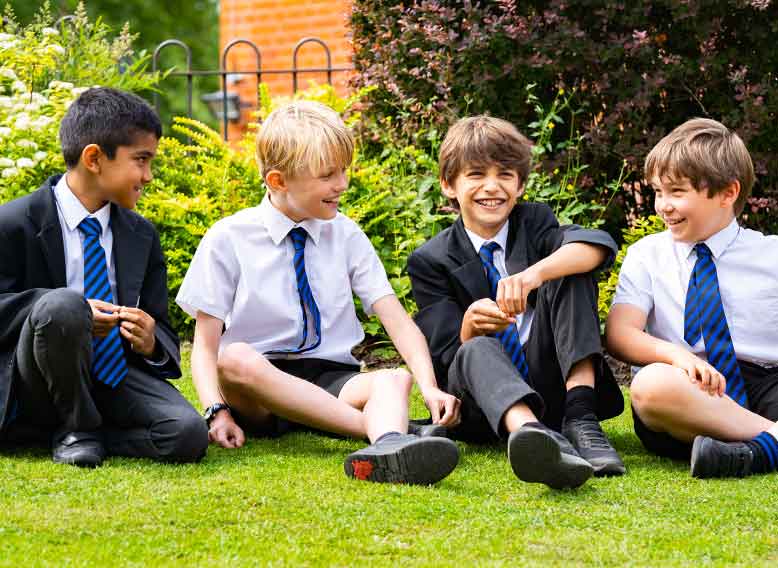
The Dulwich Spirit
Dulwich College has established a tradition of inspired learning, genuine scholarship and free thinking. We describe the Junior School as a place where boys can ‘be and do everything’, where they will be challenged inside and outside the classroom, and where they can have fun and play. Access to so many opportunities means that boys know how it feels to ‘be’ a scientist, an actor, a mathematician, a rugby player, a singer, a philosopher and more.
There is a warm and vibrant atmosphere here and we encourage boys to participate in all aspects of school life. By the time they move on to the Lower School, pupils will have been given the chance to explore, to be curious and to ask questions. We want to motivate our boys to take ownership of their learning, helping them to build a solid foundation for life in the Senior School and beyond.
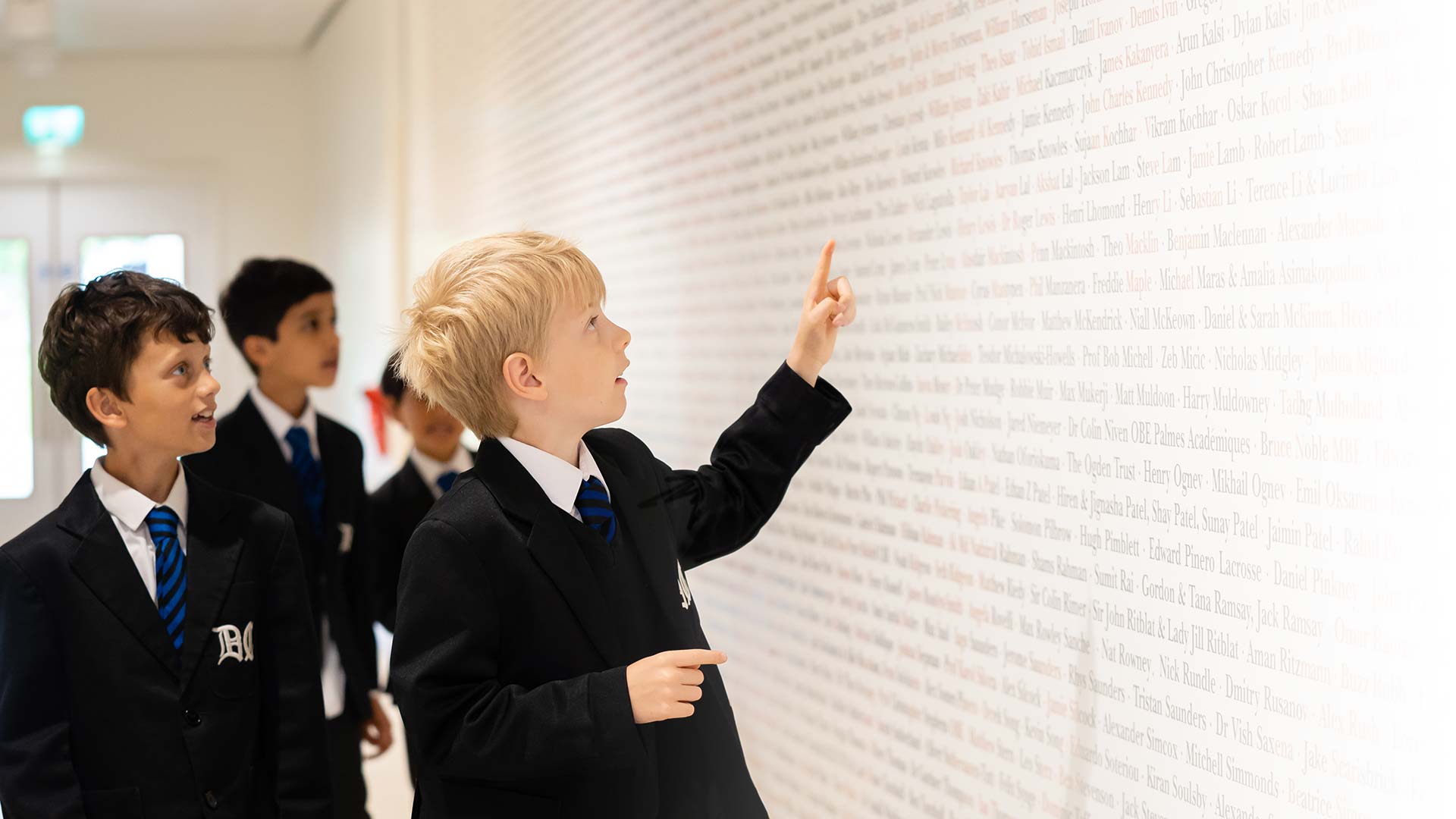
The Junior School
There are around 220 boys in the Junior School. Most join us at seven years old (Year 3) but we also have a small number of places at 9+ (Year 5). We are academically selective and celebrate the diverse range of schools and backgrounds from which our pupils come.
“Pupils are exceptionally adept at developing learning styles that suit them individually.”
ISI Report, Nov 2021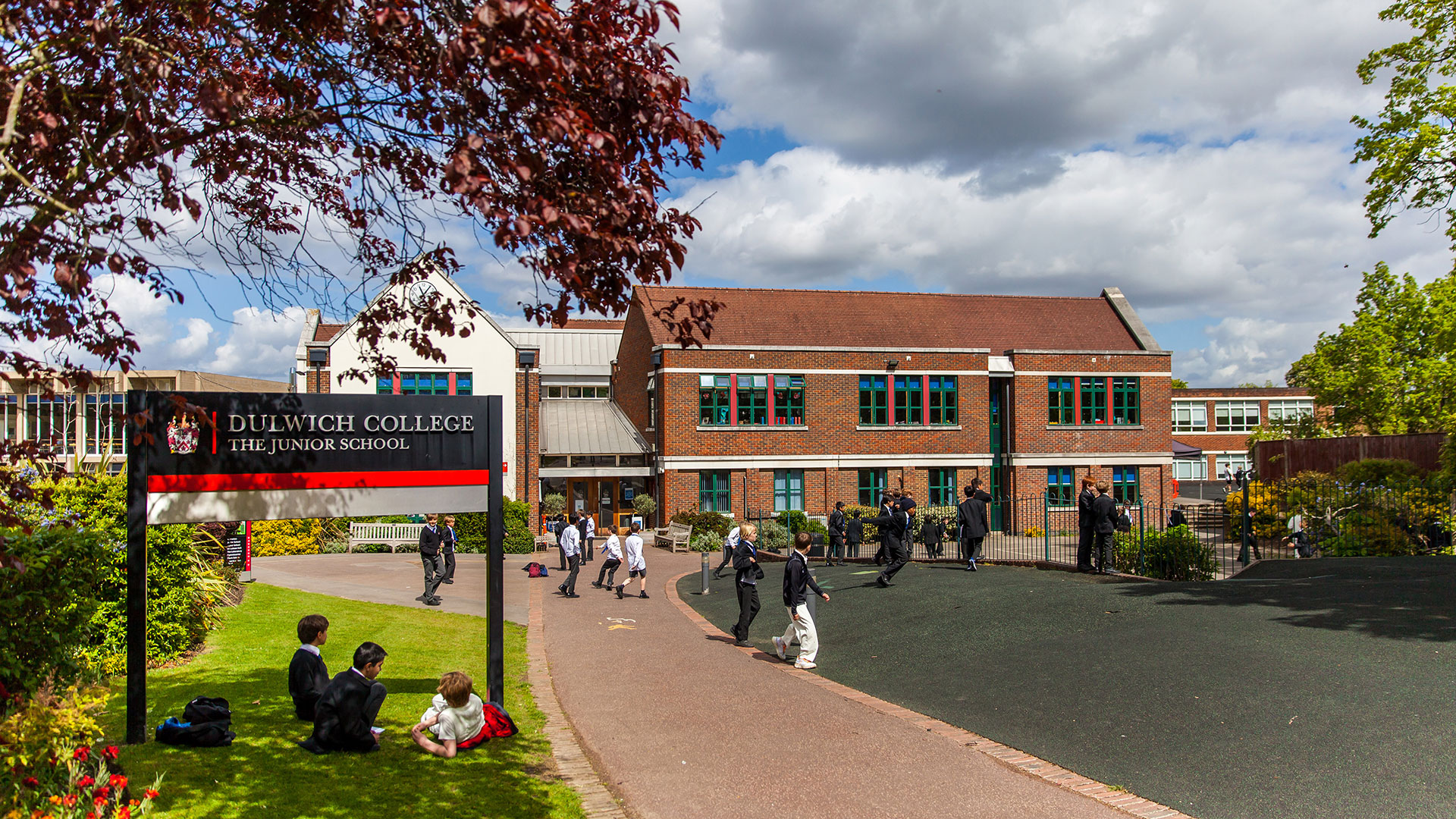
The Dulwich Campus
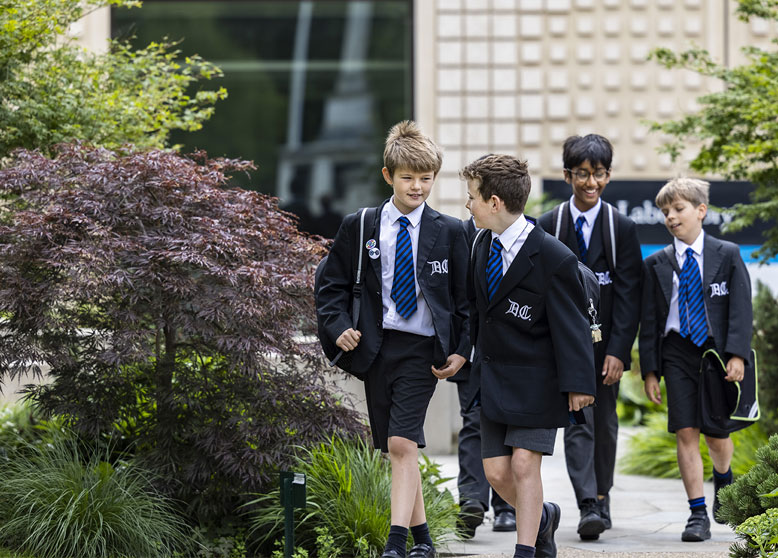
The Dulwich Campus
The Junior School is a bright, purpose-built building situated within the College’s 70 acres of leafy grounds and extensive facilities. We are a ‘small school in a big College’. This gives the boys the best of both worlds: a safe and nurturing environment from which to venture forth and enjoy the benefits of a larger school.
The College campus is continually evolving, its historic buildings combining with contemporary space. The Laboratory is our most ambitious building project since the completion of the Barry Buildings in 1870. Its exhibition and performance area make it a place in which the whole College and the wider community are able to come together, as well as a home for boys to embark on their own adventures in Science.
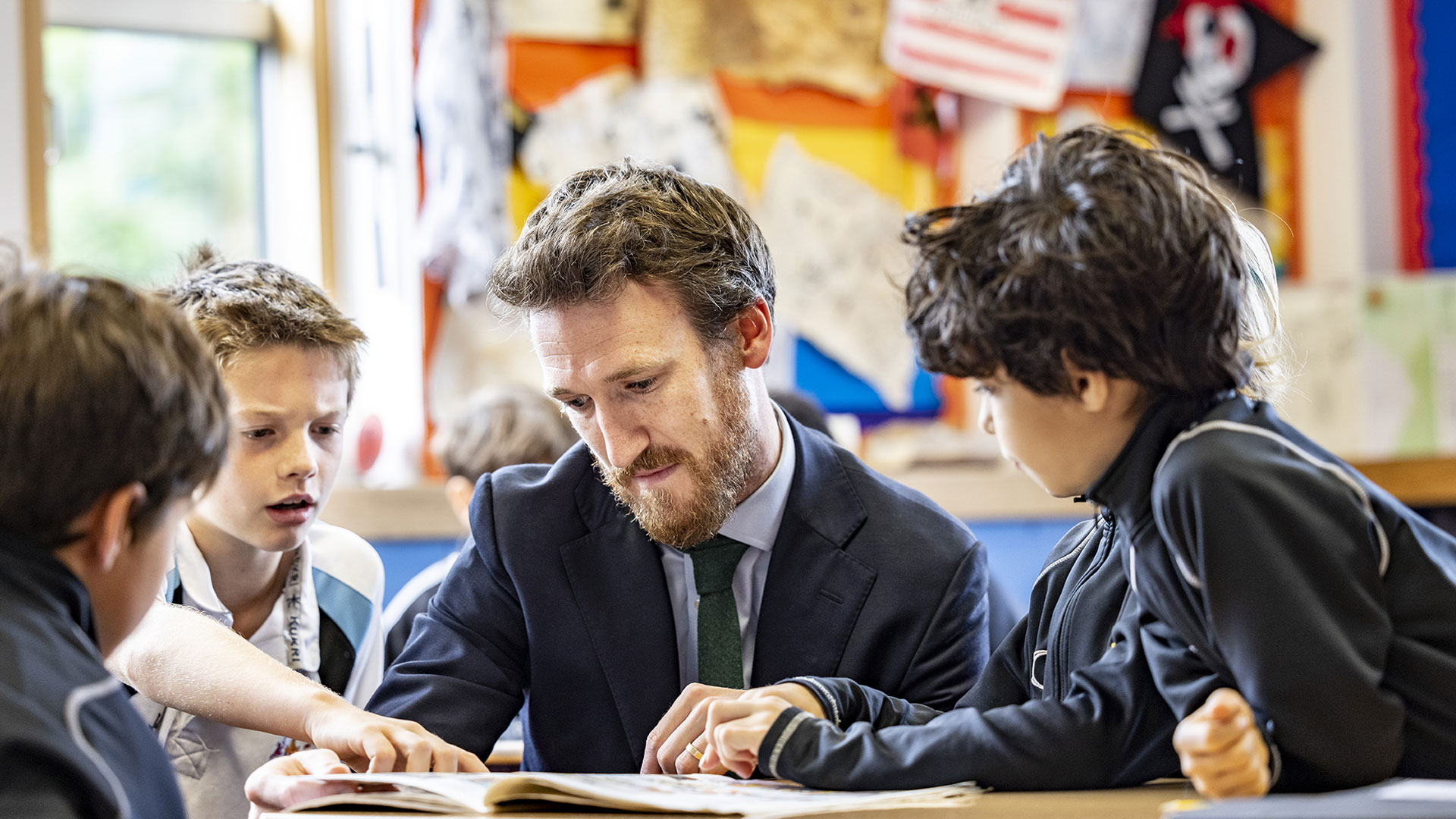
Teaching and Learning
A commitment to teaching and effective learning lies at the heart of all that we do. We teach our boys the skills that will stand them in good stead when they move to the Lower School in Year 7. As well as acquiring knowledge, we want them to learn how to engage in critical thinking, to be able to organise themselves, be confident and articulate, to take responsibility for their own learning and to be aspirational.
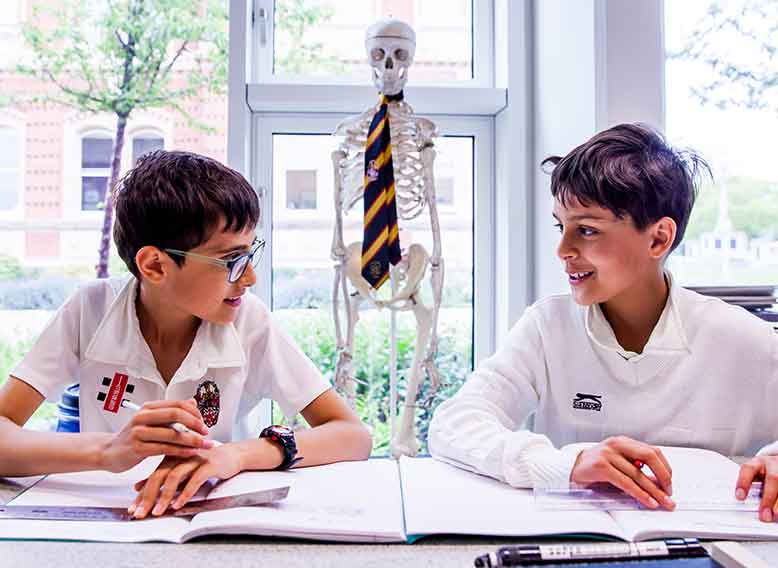
The Curriculum
In Years 3 and 4, boys receive most of their teaching from their Form Teachers. They are also taught by specialist staff for French, Art, Design Technology, Music and Games. While Form Teachers play an essential role in the boys’ holistic education, from Year 5 pupils are increasingly taught by subject specialist staff. We believe that teaching Junior School pupils is a specialist area itself and children are best taught by those who understand the specific needs of this age group.
Boys are taught Mathematics, English, History, Geography, Religious Studies, Science, French, Art, Design Technology, Music, Computing, PE, Games, Swimming, Drama, Dance, Wellbeing and Citizenship.
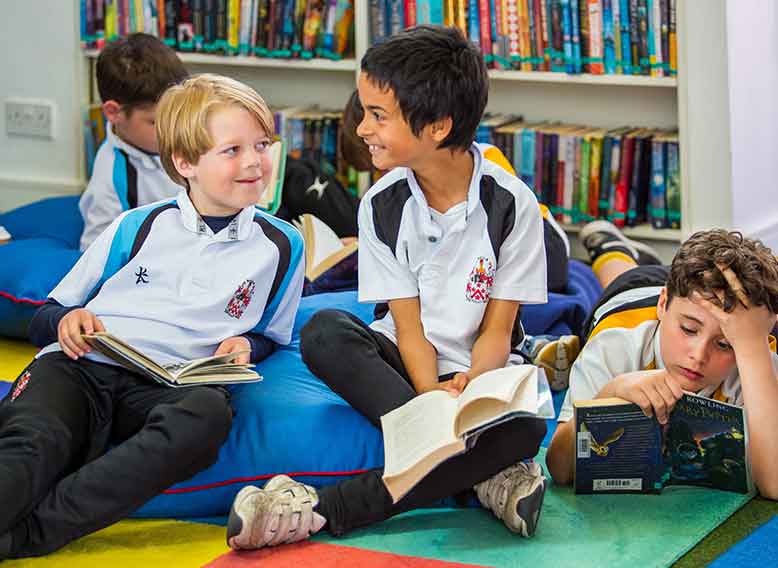
Read all about it
With a full-time Librarian and a stock of over 8,000 books and audiobooks, the Junior School Library is open from 8.30am-5pm. The Library is at the heart of the school, whether hosting lunchtime Year 3 storytelling where boys can relax as they are read a story aloud, or Year 6 Book Club for those who enjoy talking about books and making recommendations to each other. The Library supports the boys’ learning by providing opportunities for research, (both online and through the huge book collections), assisting in the development of information-handling skills and promoting a reading culture throughout the school.
Lessons are planned to encourage boys to be active participants in the learning process. We want boys to think confidently for themselves and to be excited about coming to school.
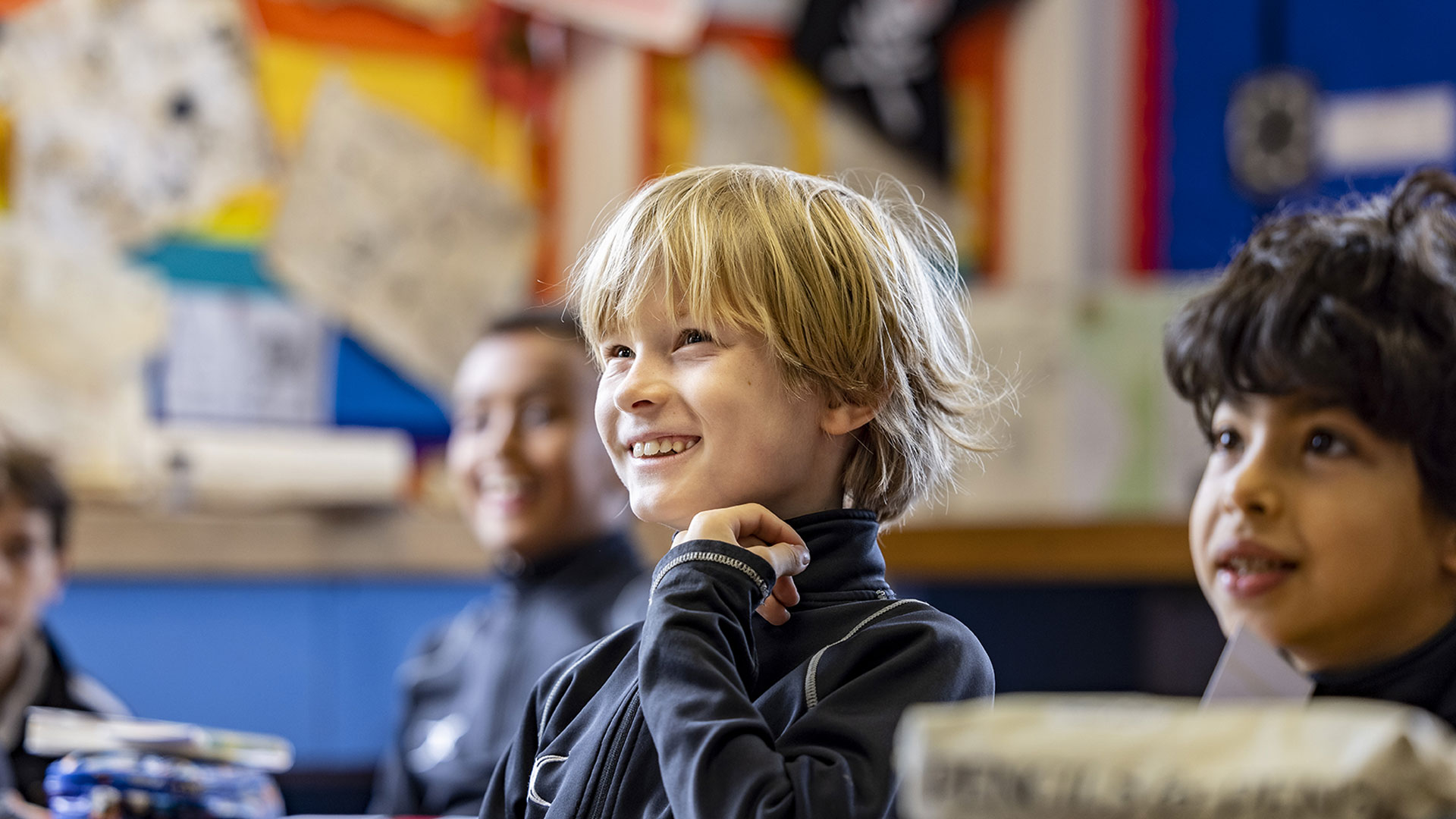
Free Learning
I love how every lesson is filled with an extra challenge that is fun and interesting.
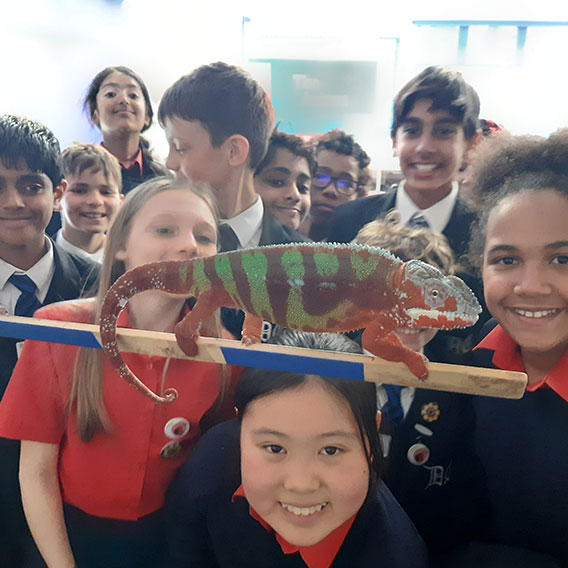
Free Learning
Free Learning is central to the ethos of the Junior School and the College as a whole. This is learning that is free from a syllabus, free from teaching just to the test, and free to challenge pupils about thinking for its own sake. It is fed by intellectual curiosity, often supported by the interest and enthusiasm of a teacher, and takes place both within-subject lessons and without.
All our pupils are ambitious academically, and we want each to find their areas of interest. Challenges, projects, investigations and problem-solving are built into our curriculum and enriched by a range of trips, visits, workshops and performances.
The Junior School Symposium, a joint venture with our sister school JAGS Junior School and Dulwich Wood Primary School, is a full day of Free Learning that focuses on discovery, encompassing the physical, creative, cognitive, scientific and mathematical. The aim of the day is for every child to experience something new, exploring themes such as Empathy, Colour, Movement, Our World, Pattern & Chaos, and Time.
The Junior School also takes part in the school-wide Dulwich Free Learning Weeks. Each year, this includes Mental Health Awareness Week, Refugee Week, Dulwich College Identity Awareness Month (DCIAM), Black History Month and Eco Week, where boys completed a trash to treasure challenge, took part in recycling relays, and explored the College’s sustainability initiatives during an orienteering session.
The culmination of our Free Learning programme in the Junior School is our Year 6 Great Exhibition where each boy completes a large project, made up of smaller mini projects, based on a question around UN global goals. Recent topics include racism in sport, sexism in the workplace, coral bleaching, and homelessness in London. Each project has an ‘action’ such as a petition, charity fundraising or letter to an MP, and is part of an exhibition to which parents and the whole school is invited.
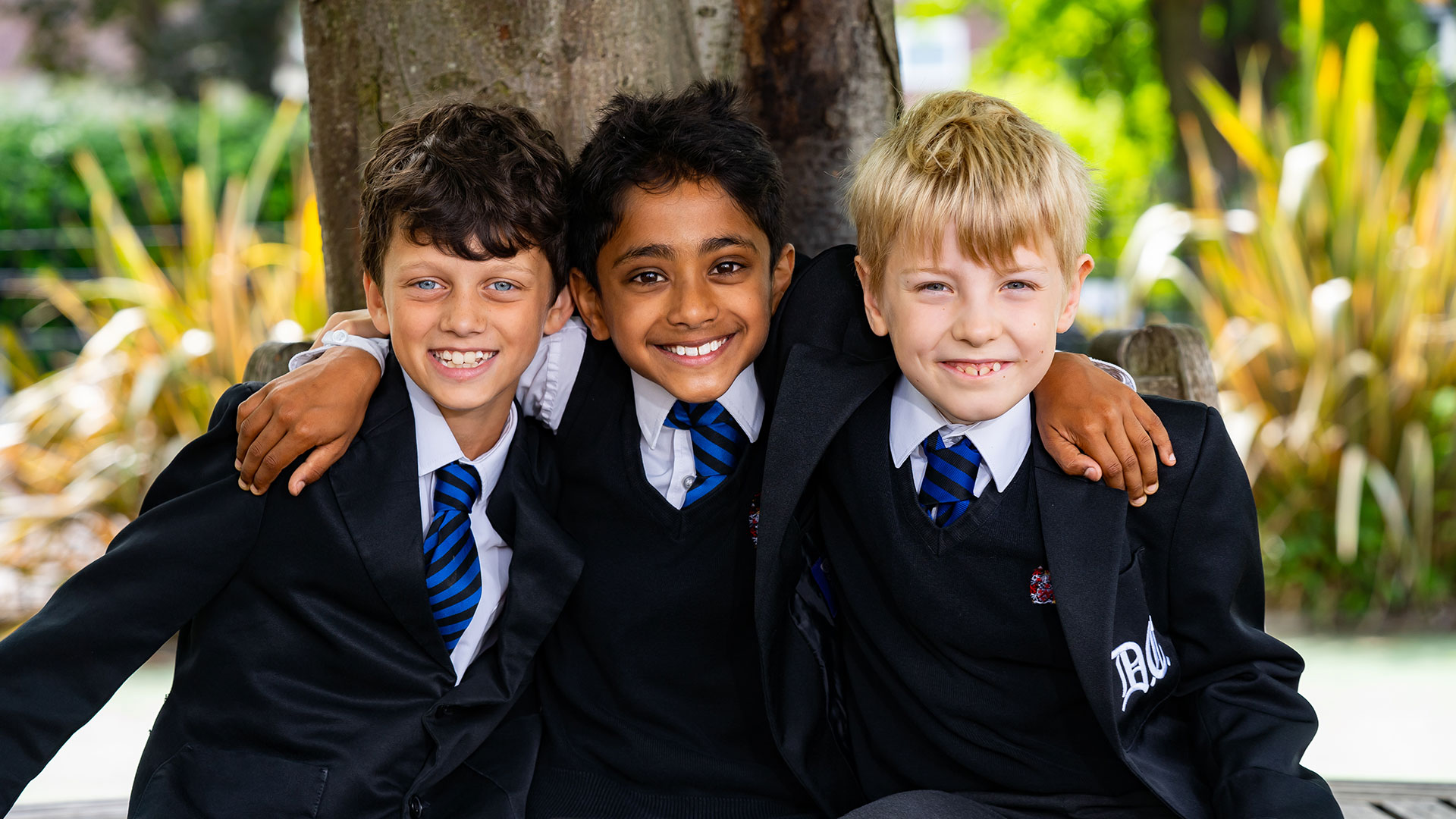
Wellbeing
Pupils show outstanding communication skills.
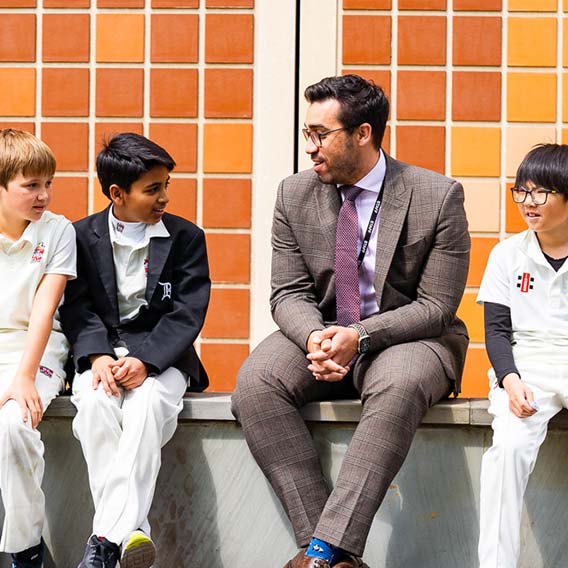
Wellbeing
Our Wellbeing programme underpins school life. As well as curricular Wellbeing lessons, assemblies are often used to promote Wellbeing topics such as living a healthy lifestyle, empathy, consent, World Mental Health Day, resilience and making good choices.
Every Friday, within our celebration assembly, leaves are added to our kindness tree when boys nominate each other for acts of kindness. The kindness tree – built specially for us by the Upper School DT club – takes pride of place in the Junior School Hall and is integral to our ethos.
All boys have one 55 minute lesson dedicated to Wellbeing, and this is often supplemented with further discussion in form period time. The Wellbeing curriculum comprises three strands: Health and Wellbeing; Relationships and Emotional Wellbeing; and Living in the Wider World. Lessons are tailored to the needs of the year group or class but common themes are repeated throughout the Junior School, often relating to the Junior School values. Each year group marks Safer Internet Day and anti-bullying week annually through special lessons and activities, and with a special assembly. Wellbeing lessons are a vehicle to: improve speaking and listening skills; extend powers of concentration; enhance relationships; to encourage respect and value each other’s differences; develop confidence and self-esteem; to support the boys as they learn to be kind, not only to each other, but also to themselves; to establish a sense of community and to have fun.
Boys can talk to any adult in the Junior School if they would like to discuss a worry and there is a post box in every classroom, as well as outside the Deputy Head’s office, for boys to seek support if they are finding it difficult to begin the conversation. Due to the close relationship between boys and their Form Teachers, most concerns are dealt with quickly by them. The extensive wellbeing team also includes year group Co-ordinators, Housemasters, the Deputy Head Pastoral and Operations, the Chaplain, Medical Centre staff, and the College Counselling Team, who can meet with boys individually or provide advice or support to parents or teachers should a particular issue arise.
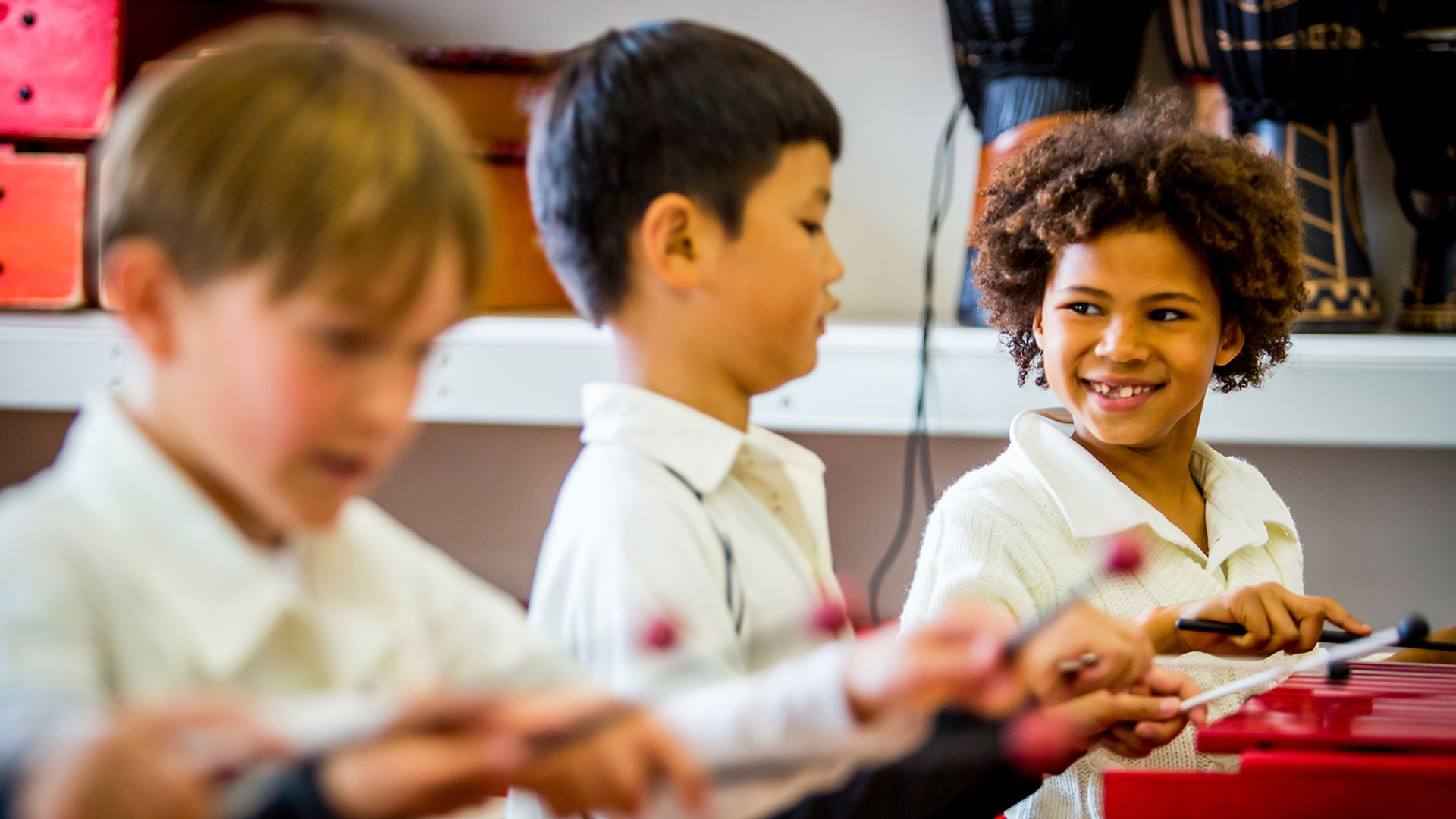
The Creative Arts
Engaging in the Arts is a vital part of the College’s philosophy and we ensure Junior School boys can explore and develop their creative potential, whether it is in an art studio, a music room or the Edward Alleyn Theatre.
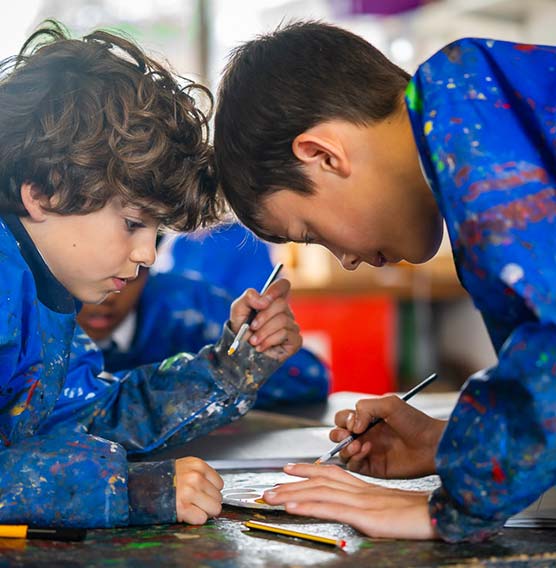
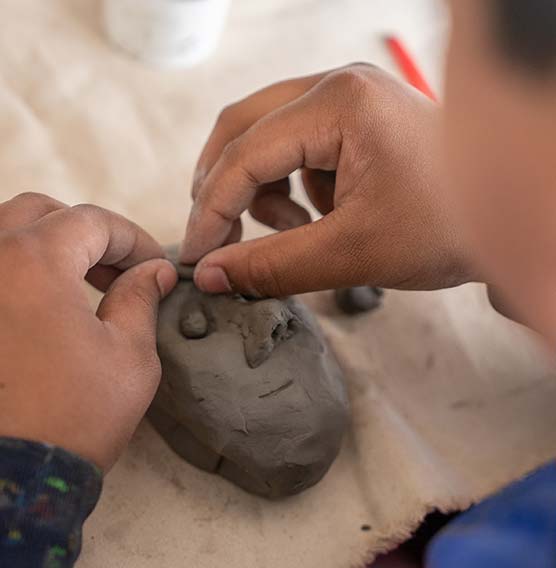
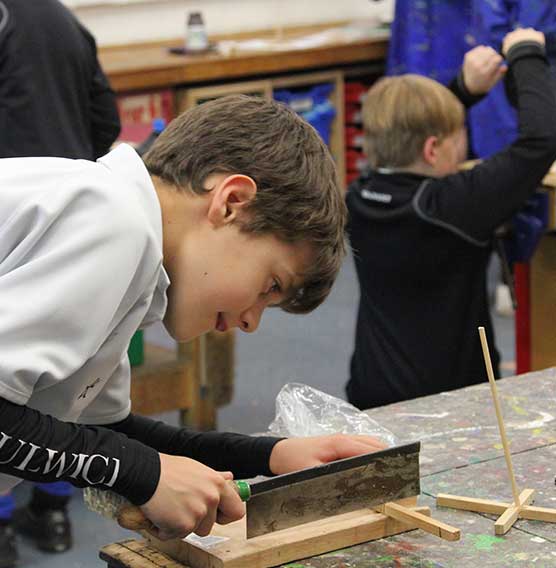
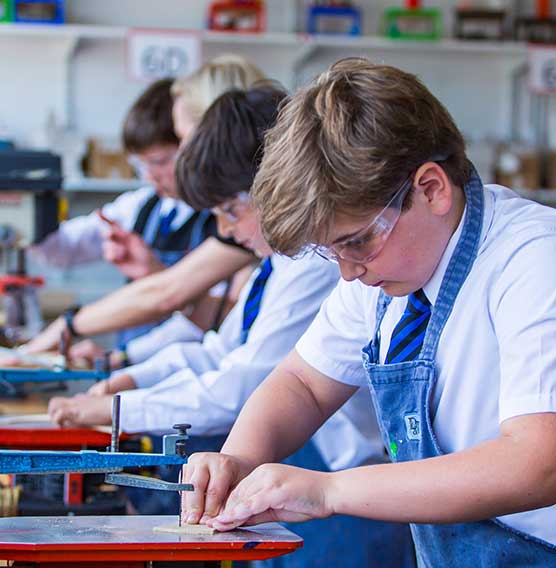
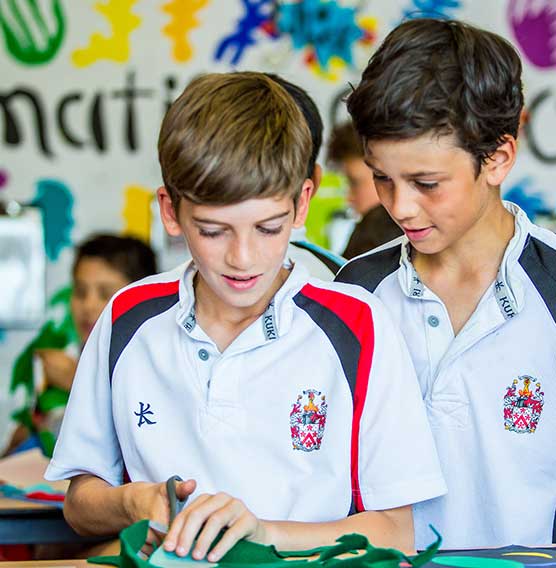
Art & Design Technology
In Art lessons we aim to stimulate the boys’ creativity and encourage them to use their imagination, working across different materials and techniques. By Year 6 some will already have developed the beginnings of a personal style. Weekly lessons in Design Technology help them develop strong design and creative skills on a variety of projects. Pupils are taught by specialist subject teachers in our dedicated Junior School Art and DT Rooms, and outside the classroom we arrange trips to galleries to study the work of artists.
The boys’ work is celebrated with regular displays and through House competitions. There is a range of art, drawing and DT co-curricular options, one of the most innovative being French Aviation Club where boys learn to make and fly foam radio-controlled planes while developing French-speaking skills at the same time!
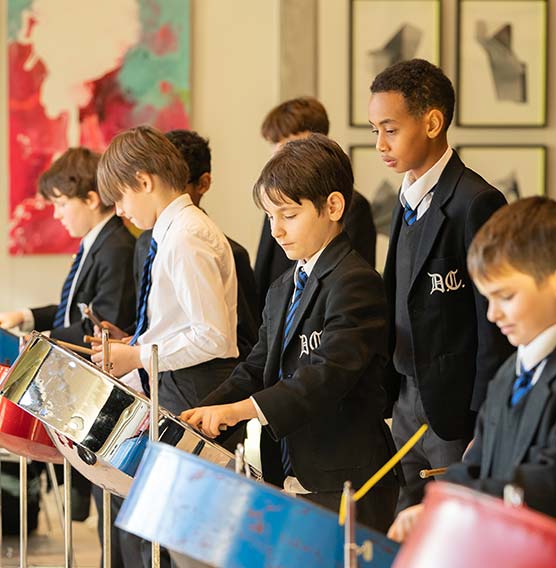
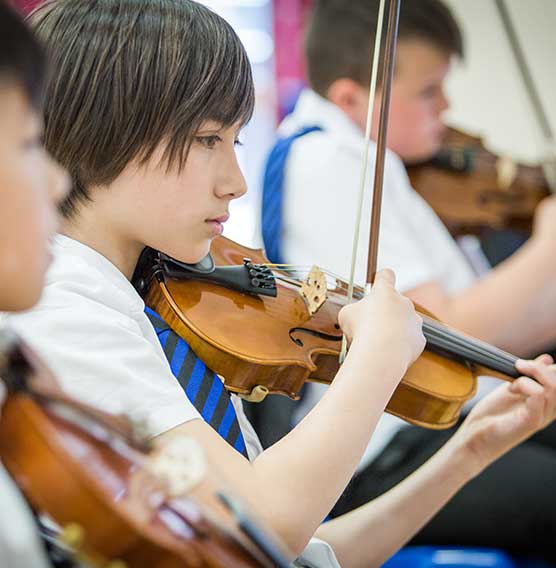
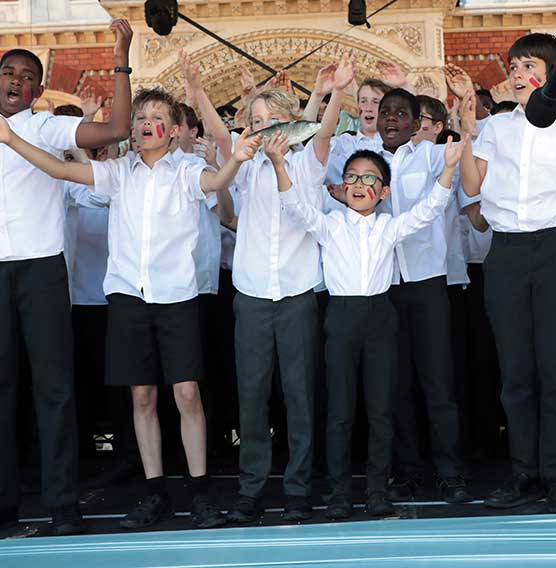
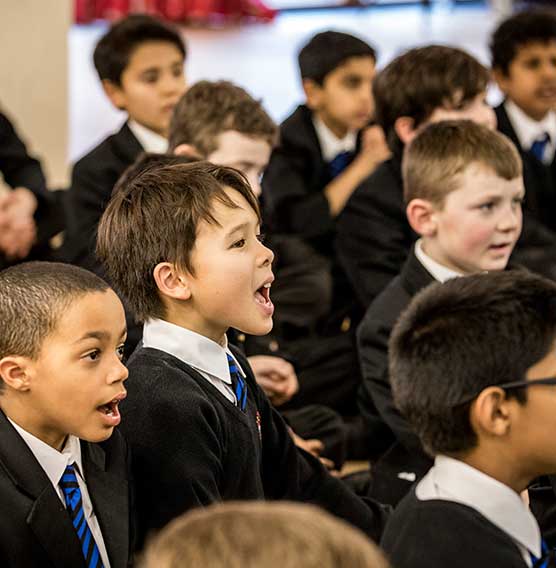
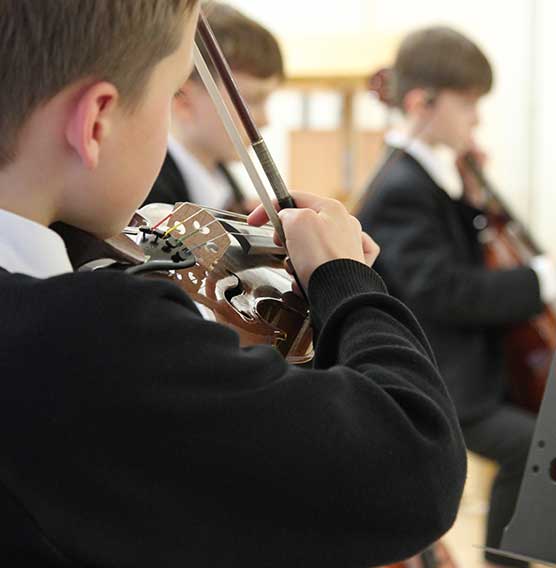
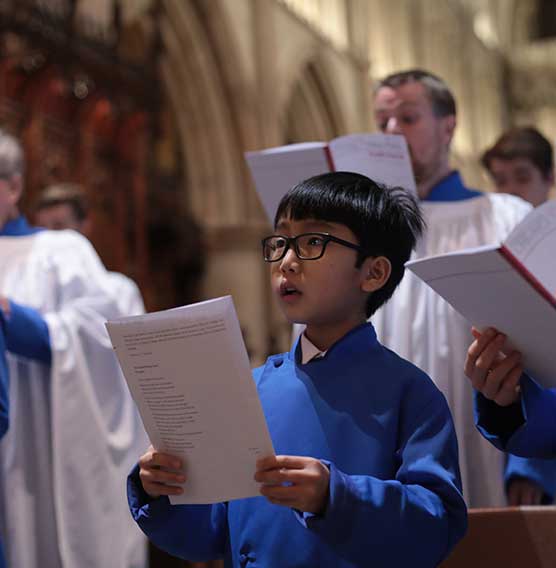
Music
Music is an integral part of College life for Junior School pupils and every boy who learns an instrument at school is invited to participate in an ensemble. In Year 3 all boys are taught a stringed instrument and in Year 4 they all play brass or woodwind during their music lessons.
There are lots of opportunities to perform throughout the year either as a member of the year group choirs where all boys sing, or as a member of the College choirs (Madrigal and Chapel), or in one of the many Junior or whole College ensembles and orchestras. Co-curricular clubs are popular too; trumpet ensemble, guitar club or Samba band are particular favourites with the boys.
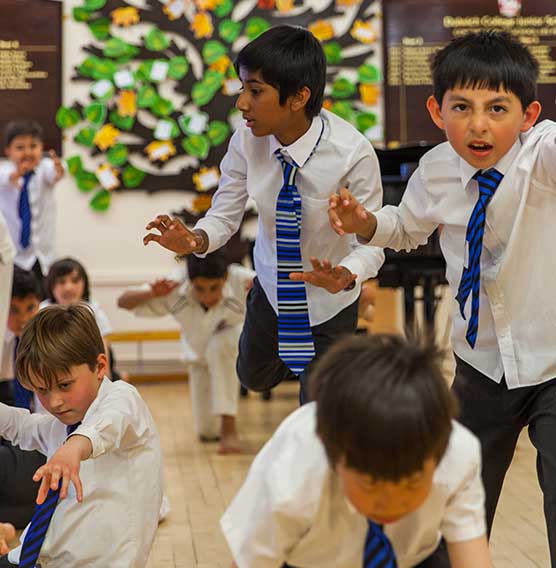
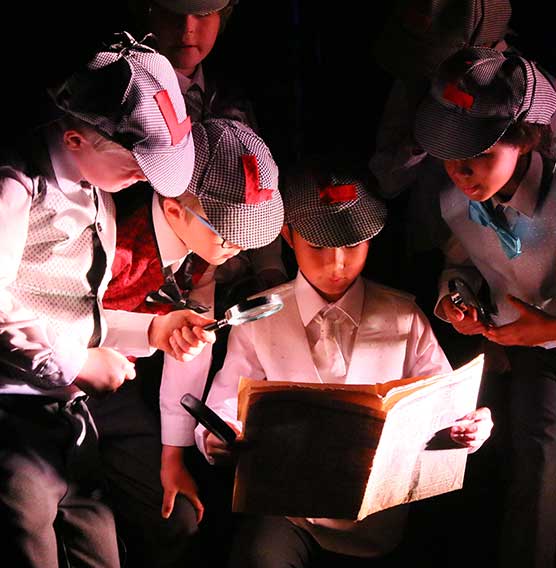
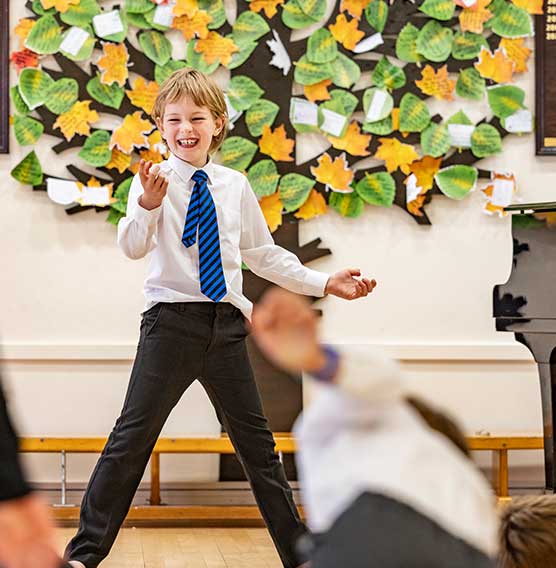
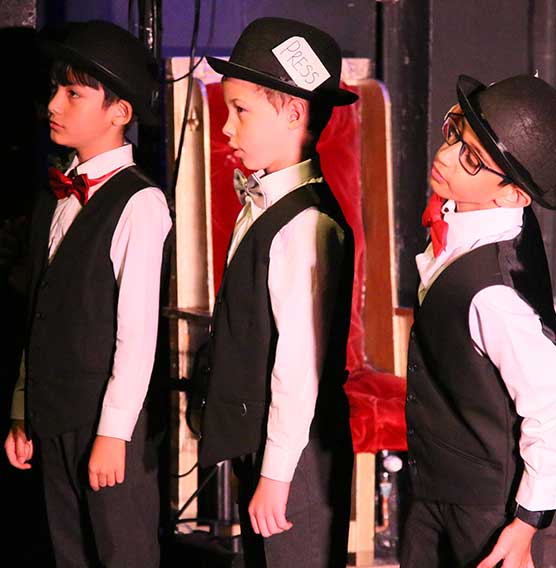
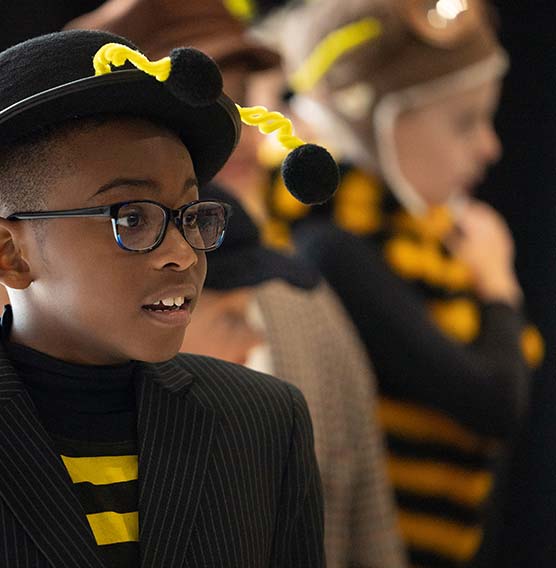
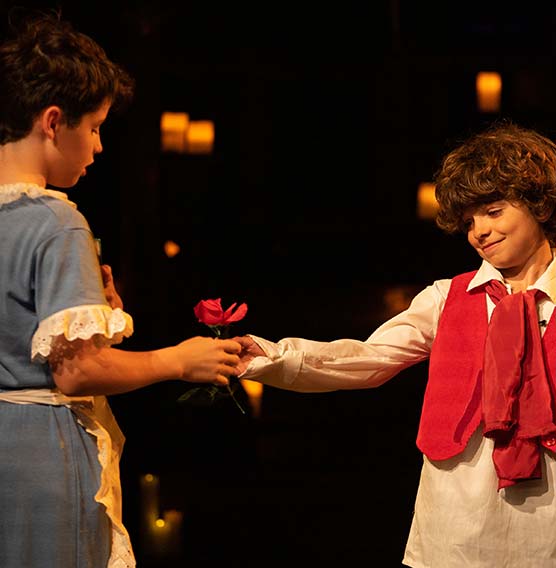
Drama, Dance & Performance
All boys in the Junior School participate in regular class assemblies and perform in a year group play or drama event at multiple points in their Junior School careers. Year 6 productions in the Edward Alleyn Theatre have included ‘Peter Pan‘, ‘The Jungle Book’ and ‘The Lion King‘. Theatre visits are organised for all year groups and theatre groups visit us regularly.
All classes are taught dance as part of the curriculum with the College’s full-time Dance teacher. LAMDA speech and drama classes are available as a co-curricular option with classes at breaktime or after school. LAMDA gives boys an appreciation of poetry, prose and play text and a chance to develop their communication and performance skills.
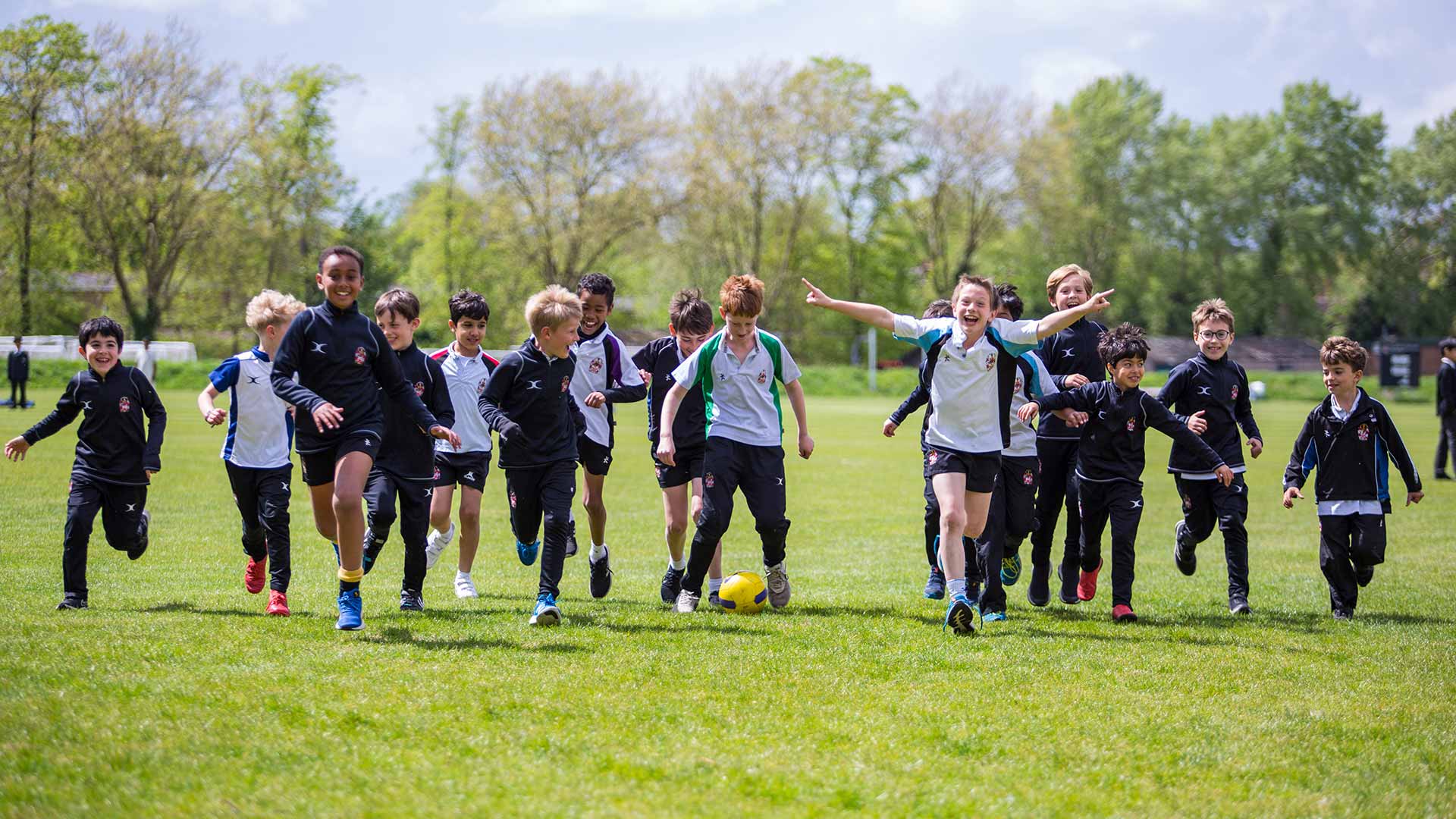
Physical Education and Games
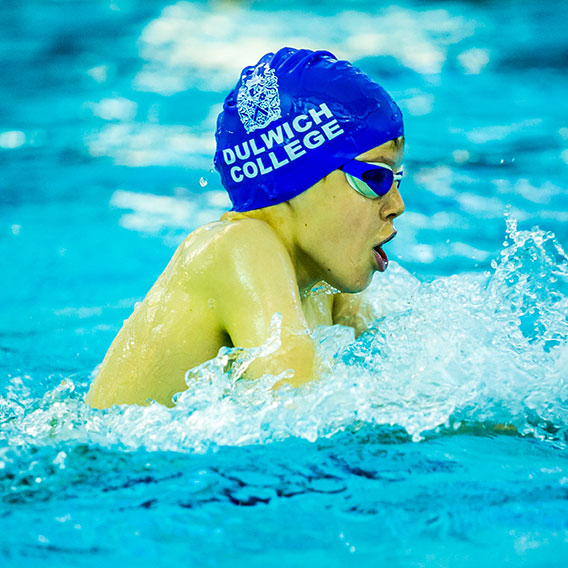
Physical Education and Games
With 70 acres of grounds, a PE Centre, tennis and squash courts, a swimming pool and a boat-house on the Thames, there is plenty of Games provision at the College.
The Junior School has an inclusive ethos. We believe each boy should have the chance to experience a range of games and to play in a team, in an atmosphere which seeks to encourage good sportsmanship and a healthier lifestyle through physical activity. During the Michaelmas term, the programme contains hockey and football, while football is played in the Lent term and cricket and athletics take place in the Summer term. There are swimming lessons throughout the year.
In every year group there are many opportunities for all boys to compete in matches against other schools in all the major sports. Boys are also entered for local and national competitions and have enjoyed numerous triumphs in rugby, hockey, football, cricket, and swimming. We regard sport as part of the boys’ overall wellbeing; it contributes to their fitness, their ability to work in a team and their capacity to deal with both success and failure with good grace.
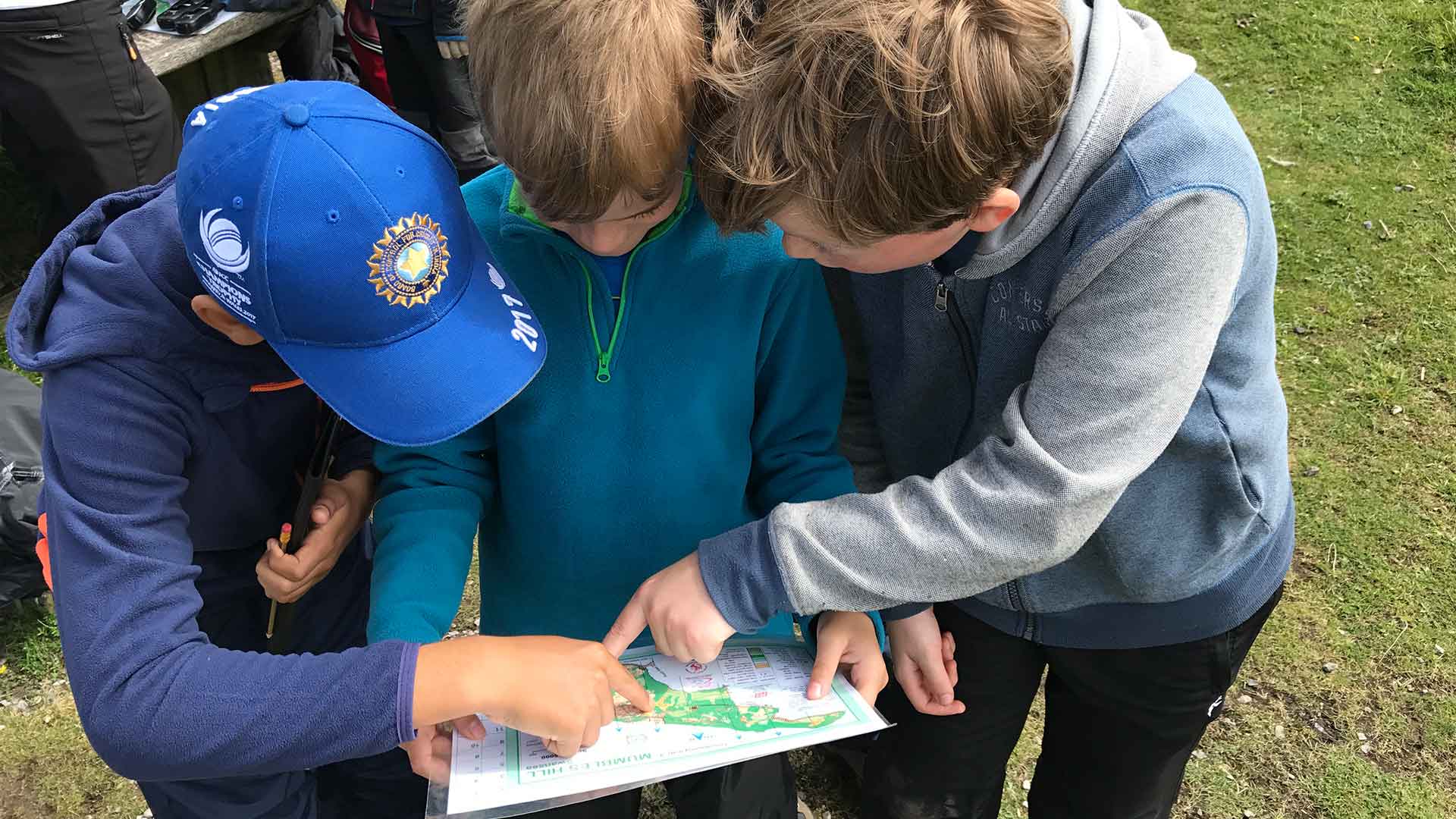
Residential Trips
The Wales trips are so much fun because there are so many different activities to do. We learn so many new things and have different opportunities. It’s also a great way to bond with new and old friends.
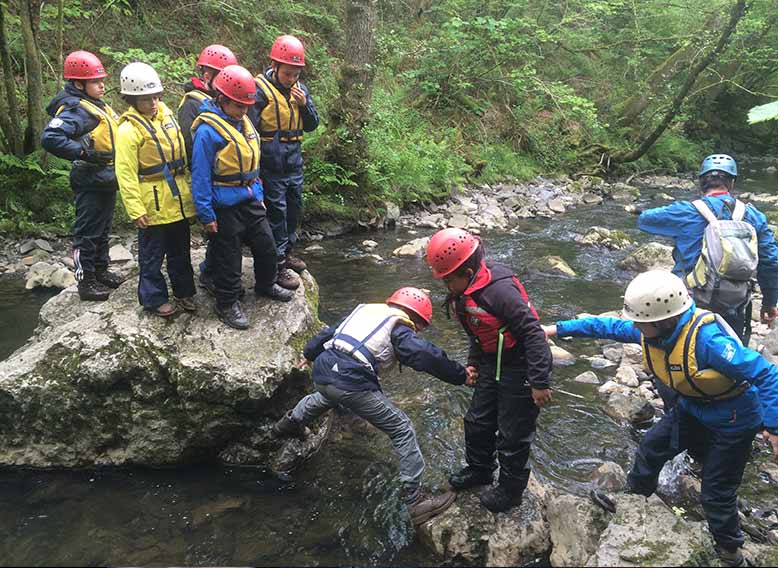
Residential Trips
A core part of the Curriculum at the Junior School is our programme of residential trips. By spending time away from home and in a new environment, pupils can develop their independence, confidence and resilience, as well as strengthen their bonds with their friends. On these trips, boys learn life skills, such as being responsible for their own belongings, stepping out of their comfort zone, and learning to live happily with others. They are encouraged to work collaboratively with their peers and engage in activities that challenge them physically and mentally. Most of all, these trips provide great fun for the boys; they take away memories that will stay with them for the rest of their lives.
For Year 3, their first residential trip is a significant milestone. The whole year group spend two days and one night at Hindleap Warren, an outdoor adventure centre in East Sussex. Here pupils have the opportunity to participate in a range of outdoor activities that both challenge and exhilarate! Pupils can push their limits with high ropes, climb and scramble over obstacles, learn bushcraft skills and, significantly, develop their teamwork skills and forge new friendships.
All boys in Years 4, 5 and 6 have their residentials at the College’s Outdoor Centre in Wales. While at the Outdoor Centre, boys take part in a carefully planned programme of activities, which builds as the pupils get older. These trips are a unique opportunity for boys to explore and connect with nature, and immerse themselves in the beautiful setting of the Brecon Beacons National Park. Canoeing, horse riding, climbing, coasteering, caving and orienteering are all on the activity roster over the three years. One of the highlights is an annual mountain walk, allowing boys to navigate their way through the stunning landscape.
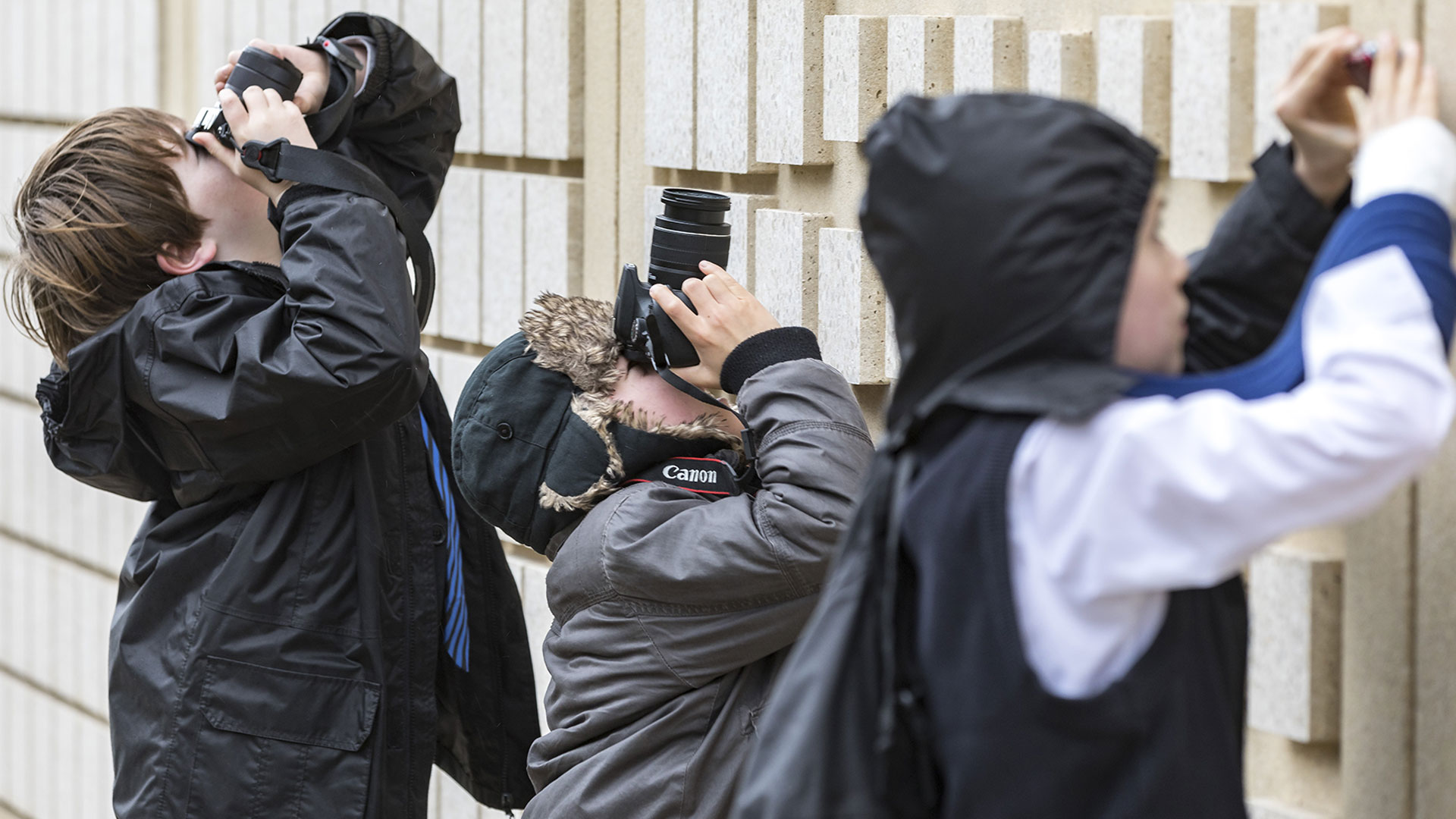
Co-curricular Activities
Over 70 clubs run each term at the Junior School, allowing pupils to explore their passions and interests outside the classroom. We offer an extensive selection of clubs catering to different hobbies, talents, and skills, and the programme of activities is regularly adapted to keep pace with the boys’ diverse and evolving interests.
Whether pupils are passionate about sports, music, drama, creative arts, film, history, computing, or languages, they will find a club that captures their interest and encourages them to grow. Our clubs and ensembles are led by dedicated and experienced teachers who guide students in developing teamwork, leadership, communication skills, and creativity. We encourage all students to take part in at least two clubs a week and take advantage of these opportunities to enhance their learning experiences, meet new friends, and broaden their horizons. Clubs run for half an hour at lunchtime and for an hour after school and include Home Learning Club and after school care until 6pm every day.
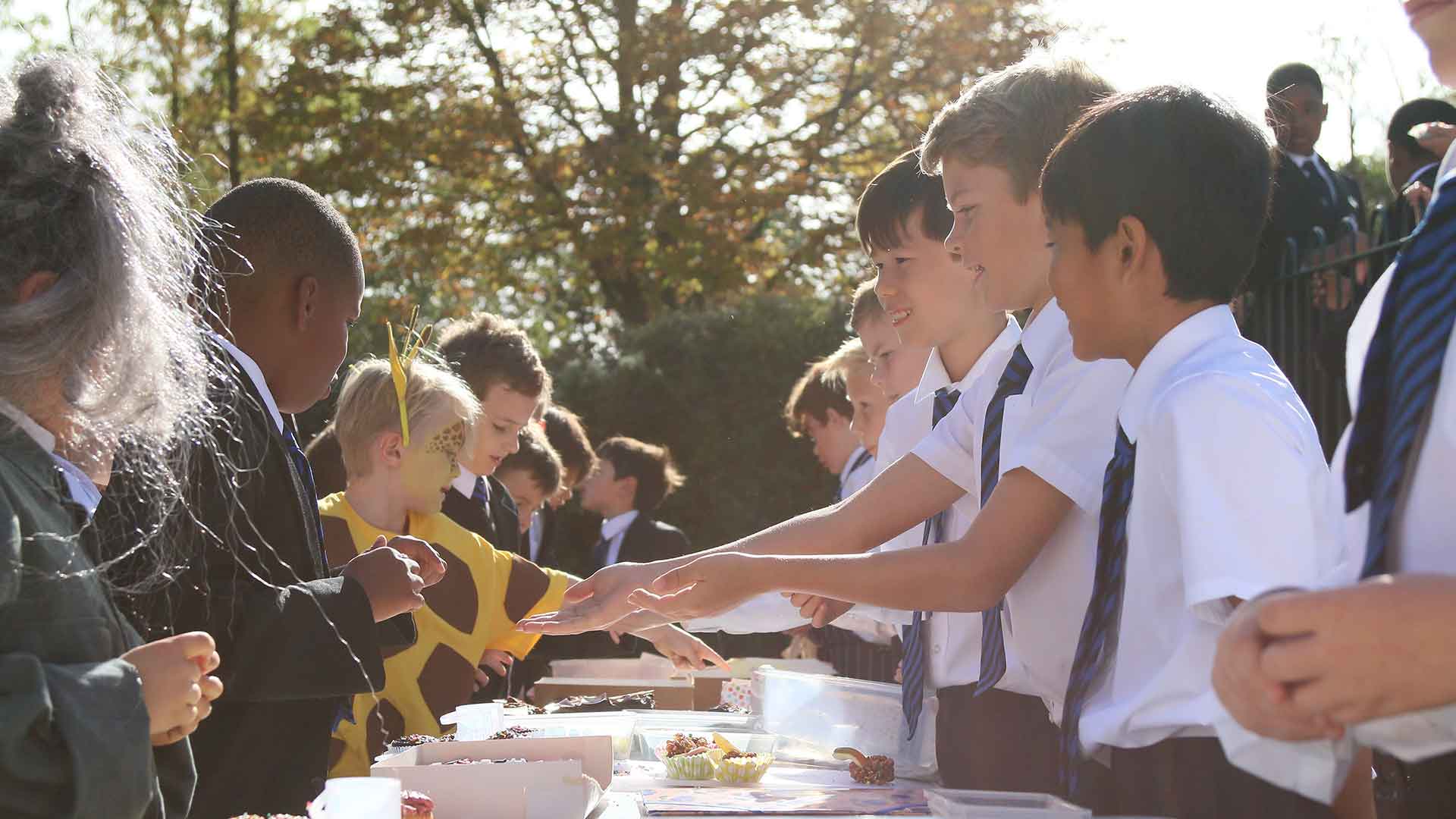
Our Community
An awareness of the needs of others and an appreciation of the capacity to help are both actively promoted through the charity fundraising and ‘service learning’ that takes place at the Junior school. Through our Wellbeing programme, which has Community Action as part of the curriculum, we aim to ensure that the boys experience giving back to the community and give their time, as well as fundraise.
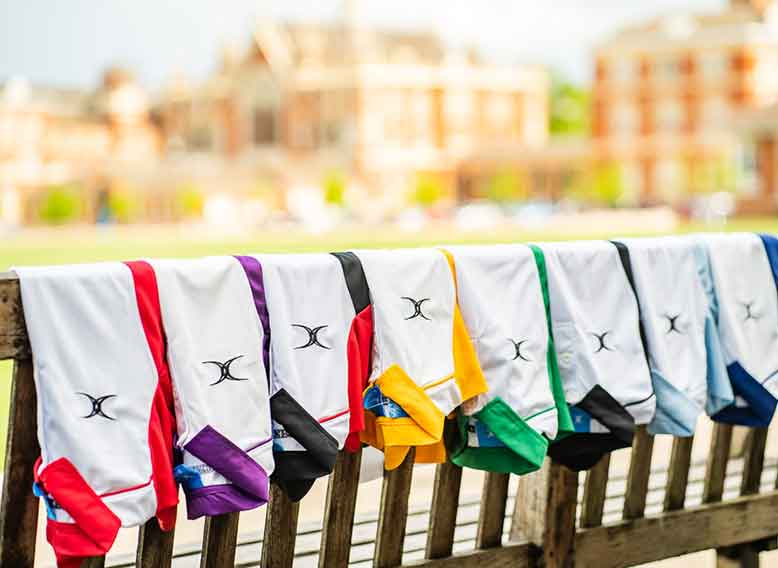
House System
On entry to the Junior School, each pupil will be placed in one of eight Day Houses where he will remain throughout his time at the College. As part of his induction, he will be paired up with an older boy from his House who will act as his ‘buddy’.
Each House is looked after by a Housemaster who is a member of staff from the Junior School, and Year 6 pupils act as House Captains and Vice-Captains. Pupils earn House points for good work and effort in the classroom and House Commendations are awarded for particularly impressive effort or achievement in any of the individual House competitions which take place throughout the year. Pupils may also be awarded their House Half Colours or Full Colours for making a significant contribution to their House over a sustained period of time.
House meetings take place approximately every fortnight and, once a term, pupils will attend a whole College House Meeting with pupils from Year 3 to Year 13. This helps to create a strong and cohesive community in which all boys are known and valued.
A wide range of House competitions are held throughout the year which reflects a spread of cultural and sporting events. This includes Cross Country, Art & DT, Creative Writing, Rugby, Music, Public Speaking, Pancake Racing, Chess, Dance and Photography, as well as many others. We also start each academic year with a House Teambuilding Day, where boys tackle physical, mental and practical challenges. This provides the boys with the opportunity to work co-operatively, to recognise the contribution of others and to utilise their own strengths for the good of their team, which is an invaluable part of the House system.
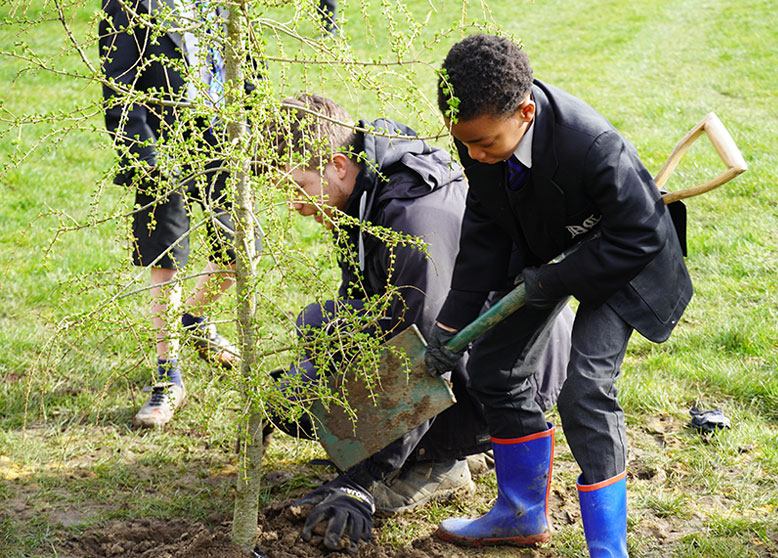
Serving Others
Each year group undertakes a separate Community Action project: Year 3s learn about visual impairment and fundraise for Guide Dogs for the Blind; Year 4 learn about poverty and they take food donations to Brixton and West Norwood Foodbank, as well as to SDCAS (Southwark Day Centre for Asylum Seekers); Year 5s learn about the elderly and host a Community Christmas tea party for residents of local care homes; and Year 6 support AFRIL (Action For Refugees In Lewisham) by helping to organise and run a Sports Day with refugee children at the Rainbow Club Supplementary School, as well as creating and coordinating fete-like stalls and fundraising at our College Service Day. We feel that it is vital that our boys begin to understand their place within the community and that they appreciate the positive impact that their actions and words can have on the wider world.
There are a wide range of additional charitable causes which are supported at various other points of the school year. An effort is made to strike a balance between larger national charities and those supporting people close to our own community in south-east London. Sometimes the Junior School will support charities that resonate particularly well with the Junior school age group and at other times we will join with the full Dulwich College school community and jointly support a common cause. Charities supported over the last couple of years include Save the Children, Gavi Alliance, National Emergencies Trust, Link Age Southwark, Show Racism the Red Card and AFFCAD.
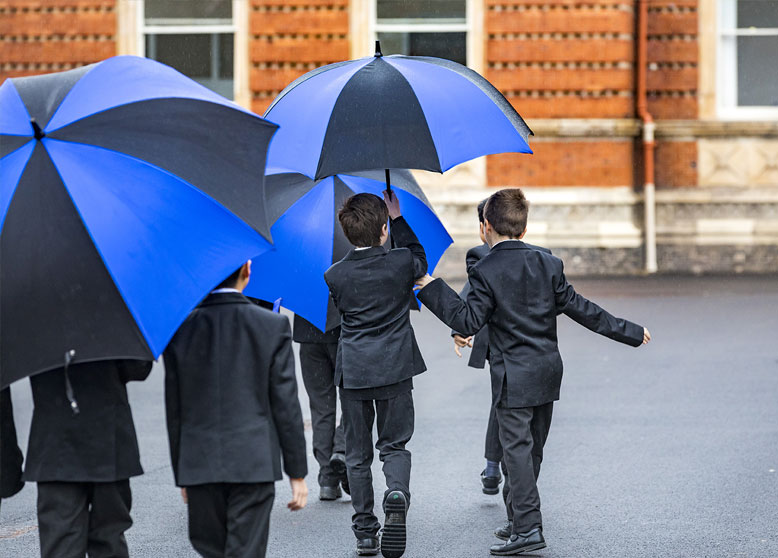
Beyond the Junior School
Our expectation is that all the boys transfer to the Lower School (Years 7 and 8) and we prepare them for the same assessment that will be taken by external applicants in the January of their final year with us. Following that assessment, Junior School boys progress smoothly to Year 7, the Lower School, and beyond.
By the time the boys leave us they will have experienced all the facets of their abilities; finding their own strengths and understanding their weaknesses. When they transfer, they will be encouraged to pursue their passions and talents and to set their own personal goals.
Contact Us
Further information on all aspects of the Junior School can be found on our website: dulwich.org.uk/junior-school. Guidance on visiting the Junior School, the registration process, fees, scholarship and bursaries is contained in Information for Applicants.
For enquiries regarding admission, including arranging a visit, please contact:
Entry into Years 3 or 5 (ages 7 and 9)
Mrs Cara Norfolk, Junior School Registrar
Telephone: +44 (0)20 8299 8432
Email: junioradmissions@dulwich.org.uk
Entry into Year 7 and Year 9 (ages 11 and 13)
Mrs Alison Williams and Mrs Polly Twisk, Registrars
Telephone: +44 (0)20 8299 9263
Email: the.registrar@dulwich.org.uk
Entry into Year 12 (age 16)
Mrs Jo Foster, Upper School Registrar
Telephone: +44 (0)20 8299 9281
Email: upperschooladmissions@dulwich.org.uk
DUCKS co-educational Kindergarten and Infants’ School (ages 6 months to 7 years)
Mrs Emma Millett, Infants’ School Registrar
Telephone: +44 (0)20 8693 1538
Email: ducks@dulwich.org.uk
